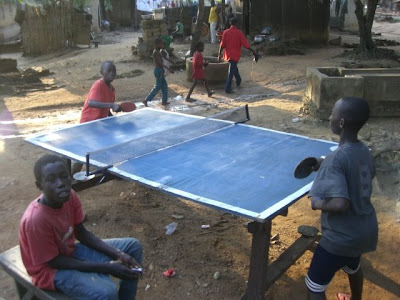
Kumasi's famous soccer team has a call sign its supporters use when passing on the street: the initiator yells "Fabu!" (short for Fabulous, the club's nickname), and he expects to hear "Kotoko!" in reply. Wearing the red uniform of Kumasi Ashanti Kotoko I executed this passing ritual every 50 paces or so this morning.
Today was gameday in Kumasi. It was the last day of the season in the Ghanaian premier league, and the first day that I have ever witnessed a live African soccer match. I picked a good one to attend, too, as the game pitted two clubs from Kumasi against each other: Ashanti Kotoko and King Faisal. Ashanti Kotoko is the club with the largest support base across the country and possibly across Africa, so I'm guilty as charged to the claims of jumping on the bandwagon. Even so, it's difficult not to like a team with the swagger of the Yankees, a history that involves its inception by an Ashanti tribal king, and a porcupine as a mascot.

I attended the match with my trusted guide Adjei (pictured with me in front of the stadium's gates), an arist and friend of our team's Ghanaian counterparts. Like in England, hooliganism puts a stain on the game of football in Ghana. Adjei helped me look out for violent fans and thieves, both of which we saw at the match.

Two Kotoko fans and 'tigo' (a cell phone service provider) phone vendors, who gave me a free shirt like the one the girl has on, in exchange for getting a picture with me on their phones.
It was an exhilirating spectacle. Two goals were scored - one by each side - in the opening 10 minutes. Two more beautiful goals later the match ended in a 2-2 draw.
The football match essentially came with a soundtrack, as a band complete with drums and trumpets started playing music and leading chants during the warm-up period and didn't stop until well after the final whistle. The crowds were at once passionate and intelligent about the sport and their team (a rarity at American sporting events), and enjoyed watching me stand and chant, cheer and sing right along with the locals.

The King Faisal players celebrate a goal by running towards the crowd.
Adjei and I were dissapointed when the final whistle blew, as we wanted to see the Kotoko side come out with a win instead of a draw. But alas, that's football. And today it was fabulous.

Supporters of the Kumasi Ashanti Kotoko football club.










